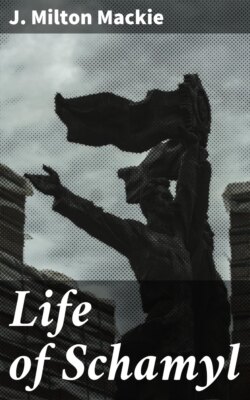Читать книгу Life of Schamyl - J. Milton Mackie - Страница 18
На сайте Литреса книга снята с продажи.
HIS HORSEMANSHIP.
ОглавлениеSchamyl, now become a deli-kan, is said to have been so ambitious of the palm in all youthful games that whenever defeated he would brood for days together over his disgrace in silent chagrin. From his childhood he knew not how to brook a superior.
He therefore zealously continued his exercises, particularly those in horsemanship. Like that of all Circassian youth it was his ambition not only to sit his horse a perfect centaur, to dash at full speed up steeps and down precipices, to leap the chasm and to swim the torrent; but also on the gallop to discharge his weapons, in an instant unslinging his gun from behind his back, and as quickly returning it to its place; to hang suspended from the side of the horse so as to avoid the aim of an enemy; to spring to the ground for the purpose of picking up something and again vault into the saddle without halting; and to take aim with such precision as to hit the smallest and most inconveniently placed mark while going at full tilt.
The subduing of a half-wild horse in the herd which is allowed during a portion of the year to roam the woods and hills, is also a feat frequently practised by the Circassian cavalier, either for the sake of securing the animal, or simply as an exercise in horsemanship. A rider or two armed with lassos plunge into the midst of the herd, and selecting one of the wildest of the stallions—for mares are not used under the saddle—secure him by throwing over his head the noose. Then the cavalier who is to make trial of his skill springs upon the back of the animal, which with dilated eyes and smoking nostrils exhibits the greatest consternation. And now commences the contest between horse and rider. Furious as well as frightened the brute speeds like an arrow over the hills or down the valleys. He turns and doubles, halts suddenly, rolls on the ground, crawls on his belly, dashes into the midst of the herd, and tries in all possible ways to get rid of the burden he has no fancy for. But the intrepid rider, self possessed, and constantly on the alert, sits upon his back as if a part of the animal, waving his hand in triumph after every struggle terminated in his favor; and there he continues to sit and hold the mastery until the strong steed, finally exhausted by his efforts, covered with foam, out of breath, and cowed in spirit, acknowledges the superiority of his antagonist.
When tamed, however, the Circassian horse is both perfectly gentle and attached to his master. The pet brought up in the yard is as playful as a kitten. The children gambol with him. His master fondles him, patting his neck and kissing his head. On festal days and occasions of ceremony he is decked out with red-cloth trappings; his neck is wreathed with many-colored glass beads; ribands are tied in his mane; and bunches of wild flowers nod from his foretop. The stranger may not praise the Circassian's wife or child for fear of shedding over them the malign influence of the evil eye, or for other reasons less fanciful; but to the praises of his steed the warrior's ear is ever open. The faithful animal is his companion on all his excursions; he drinks with him the waters which flow through the plains of the enemy; he looks down as well as himself from the rock on the passing column and the squares of infantry; he shares with him the dangers of the bayonet and the bullet; and, neighing, participates too in the hurrah of the onset and the shouts of victory. Trained to take part in the ambuscade, he will creep after his master like a dog, and lie crouching at his feet in silence. No unkind word is ever spoken to him; nor is he ever beaten; so that his spirit is unbroken, and his attachment to his lord is manifested by the pleasure he takes in his caresses, the gladness with which, snorting and pawing the ground, he receives him on his back, the pride of step and eye with which he bears him off, the fury with which he dashes into the fight and pursues the enemy, and the intelligent fidelity with which he obeys every movement of the rein or the hand, dutiful until he falls bleeding at last on the field of battle, or at a very advanced age is relieved from further service, and with clipt tail and mane is turned out to graze the peaceful pastures until the day of his death.
There are a number of varieties of the Circassian horse, though without very marked differences. Those of Kabarda are among the most famed; and excellent cavalry horses are got by Pratof's stallions out of the Tartar and Kalmuck mares. These are valued at from two to three hundred roubles. The Turcoman breed also is highly esteemed, standing about fifteen hands high, in perfect training, and joining to the strength of a bull the spirit of a lion. But universally throughout the Caucasus the native horse is docile, fleet, capable of enduring very great fatigue, of supporting very great privations, possessed of the most undeniable mettle, and endowed with the largest measure of intelligence and affection within the capacity of the animal's nature. In the best breeds his pedigree is kept with care; and the mark of his master is branded in the shape of a horse-shoe, an arrow, or some similar device on his haunches.
